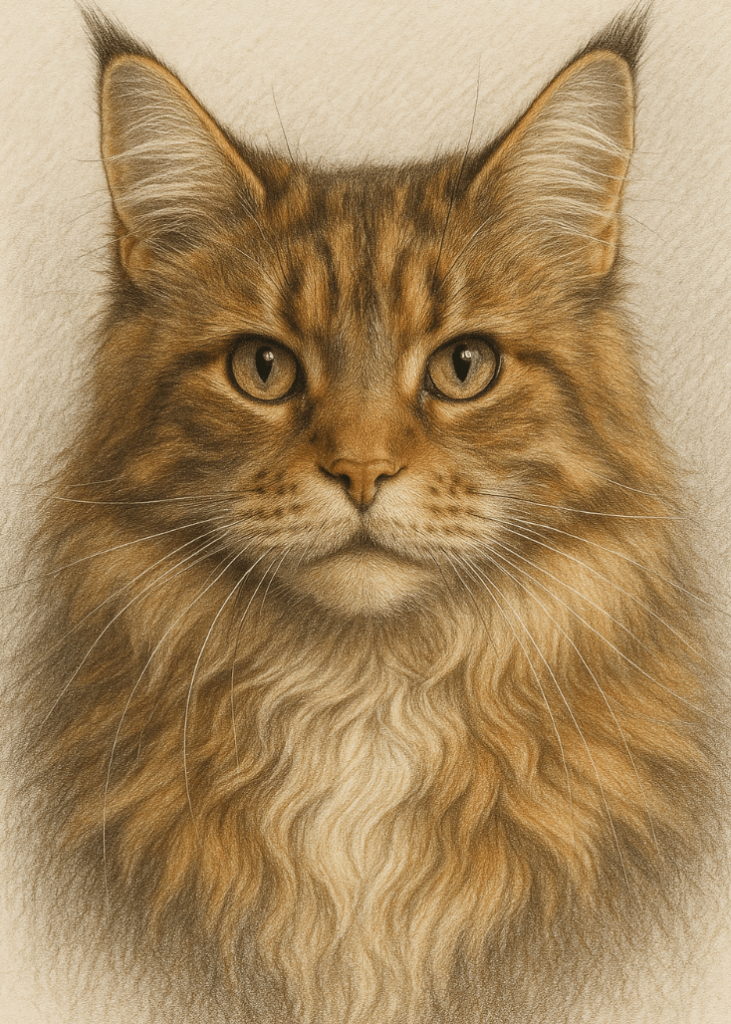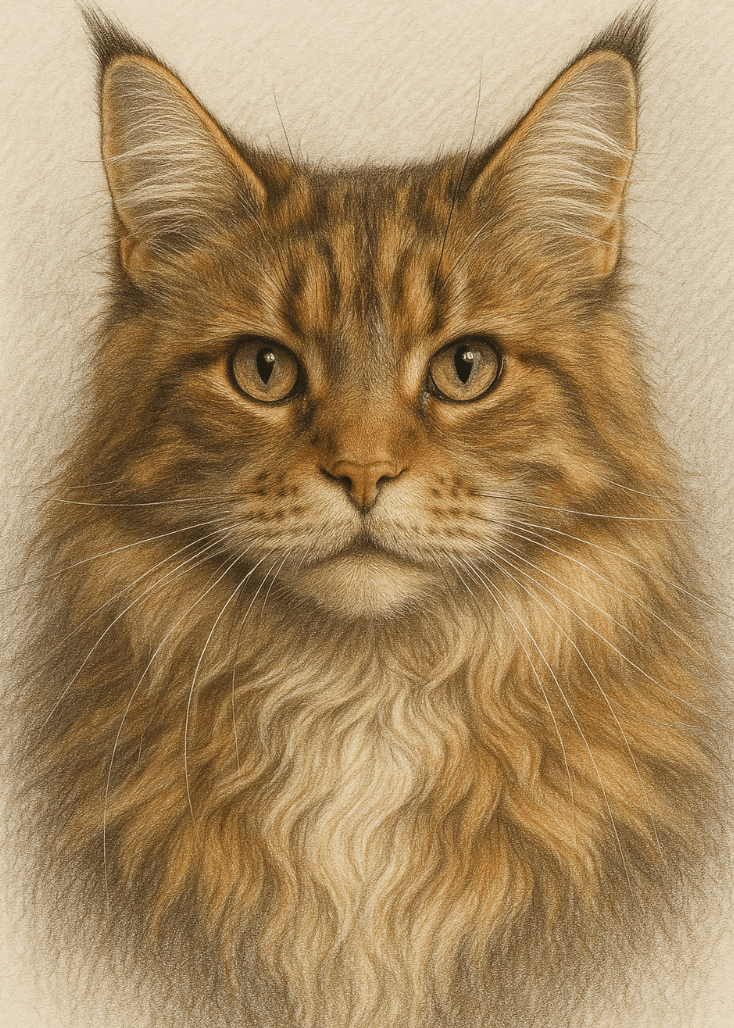Average Lifespan of a Maine Coon: What You Need to Know
The Maine Coon, often referred to as the “gentle giant” of the cat world, is beloved for its striking appearance, friendly demeanor, and playful personality. As one of the largest domesticated cat breeds, the Maine Coon captures hearts with its tufted ears, bushy tail, and luxurious coat. However, one of the most important aspects of owning a Maine Coon is understanding their average lifespan and how to maximize their years of companionship. With proper care, these majestic felines can live long, healthy lives, bringing joy to their families for over a decade. In this blog post, we’ll explore the factors that influence their lifespan, tips for ensuring their well-being, and what to expect as they age.
Factors Affecting the Average Lifespan of a Maine Coon
The average lifespan of a Maine Coon typically ranges from 12 to 15 years, but several factors can influence how long your furry friend stays by your side. Understanding these elements can help you provide the best possible care for your cat.
Genetics:
A cat’s genetic makeup plays a significant role in determining their lifespan. Responsible breeding practices can reduce the risk of hereditary health issues.Diet and Nutrition:
A balanced, high-quality diet supports overall health and longevity, providing essential nutrients for growth, energy, and immune function.Veterinary Care:
Regular check-ups, vaccinations, and preventive treatments for parasites are crucial for catching potential problems early.Living Environment:
A safe, stress-free home minimizes risks like accidents or exposure to toxins, contributing to a longer, healthier life.Exercise and Mental Stimulation:
Physical activity and mental engagement prevent obesity and boredom, which can negatively impact a cat’s health.
By addressing these factors, you can help your Maine Coon live a fulfilling and extended life.
Health Issues That May Impact a Maine Coon’s Lifespan
While Maine Coons are generally hardy cats, they are prone to certain breed-specific health conditions that can affect their lifespan. Being aware of these issues allows you to take proactive steps in managing their health.
Hypertrophic Cardiomyopathy (HCM):
This common heart condition in Maine Coons can lead to heart failure if not monitored and managed properly.Hip Dysplasia:
Larger cats like Maine Coons are at higher risk for hip dysplasia, which can cause mobility issues and discomfort.Polycystic Kidney Disease (PKD):
Though less common, PKD can lead to kidney failure over time, requiring early detection through screenings.Obesity:
Due to their large size, Maine Coons are prone to weight gain, which can exacerbate other health problems.Dental Disease:
Poor oral hygiene can lead to gum disease and infections, impacting overall health and lifespan.
Understanding these potential health concerns empowers you to prioritize preventive care and early intervention.
Check this guide 👉How Much Does a Maine Coon Cat Weigh? Best 7 Expert Tips!
Check this guide 👉Where Do Maine Coon Cats Come From? Best 7 Expert Tips!
Check this guide 👉How High Can a Maine Coon Jump? Best 7 Expert Tips!

Tips to Extend Your Maine Coon’s Lifespan | Common Health Risks to Watch For |
|---|---|
Provide a high-quality, balanced diet | Hypertrophic Cardiomyopathy (HCM) |
Schedule annual vet check-ups | Hip Dysplasia |
Keep them physically active with playtime | Polycystic Kidney Disease (PKD) |
Maintain good dental hygiene | Obesity |
Create a safe, stress-free environment | Dental Disease |
How to Maximize Your Maine Coon’s Lifespan
Taking proactive steps to care for your Maine Coon can significantly impact their quality of life and longevity. Here are some practical tips to ensure they thrive.
Feed a Species-Appropriate Diet:
Choose high-protein, low-carbohydrate food that mimics their natural dietary needs. Avoid overfeeding to prevent obesity.Encourage Daily Exercise:
Engage your Maine Coon in interactive play with toys like feather wands or laser pointers to keep them active and mentally stimulated.Brush Their Coat Regularly:
Their long, thick fur requires frequent brushing to prevent matting, hairballs, and skin issues.Monitor Their Weight:
Regularly weigh your cat and consult your vet if you notice significant changes, as weight fluctuations can signal underlying health problems.Provide Mental Enrichment:
Puzzle feeders, climbing trees, and new toys can keep their curious minds engaged and reduce stress.
By implementing these strategies, you can help your Maine Coon live a longer, healthier life.
Signs of Aging in Maine Coons
As your Maine Coon grows older, they may exhibit physical and behavioral changes that indicate the aging process. Recognizing these signs helps you adjust their care accordingly.
Decreased Activity Levels:
Older cats tend to sleep more and play less, so provide cozy resting spots and gentle play opportunities.Changes in Appetite:
A loss of interest in food or difficulty eating may signal dental issues or other health concerns.Weight Fluctuations:
Unexplained weight loss or gain can indicate metabolic changes or underlying illnesses.Grooming Habits:
Senior cats may groom themselves less frequently, leading to matted fur or skin problems.Behavioral Shifts:
Increased vocalization, confusion, or irritability can be signs of cognitive decline or discomfort.
Understanding these changes allows you to adapt your care routine and ensure their golden years are comfortable and happy.
Fun Facts About Maine Coons and Their Longevity
Maine Coons are fascinating creatures with traits that contribute to their longevity and appeal. Here are some interesting facts about this remarkable breed.
Historical Roots:
Believed to have originated in the United States, Maine Coons were prized for their hunting skills and ability to adapt to harsh climates.Slow Maturation Process:
Unlike other breeds, Maine Coons take 3-5 years to reach full maturity, giving them a longer “youthful” phase.Cold Weather Adaptation:
Their thick, water-resistant coats and tufted paws allow them to thrive in colder environments, supporting overall resilience.Social Nature:
Known for their friendly and sociable personalities, Maine Coons often form strong bonds with their human families, reducing stress.Record Holders:
Some Maine Coons have lived into their late teens or early twenties, showcasing their potential for a long lifespan with proper care.
These fun facts highlight why Maine Coons are such extraordinary companions.
Tips for Caring for a Senior Maine Coon
As your Maine Coon ages, their needs will change, requiring adjustments to their care routine. Here are some tips to ensure their senior years are comfortable and joyful.
Adjust Their Diet:
Senior cats benefit from food formulated for their age, with lower calories and added joint support.Provide Comfortable Resting Spots:
Soft beds or heated pads can ease joint pain and provide warmth during cooler months.Schedule Frequent Vet Visits:
Biannual check-ups help monitor their health and catch potential issues early.Simplify Access to Resources:
Place food, water, and litter boxes in easily accessible locations to accommodate reduced mobility.Maintain Routine Grooming:
Older cats may struggle to groom themselves, so regular brushing keeps their coat healthy and reduces hairballs.
By adapting to their changing needs, you can ensure your senior Maine Coon enjoys a high quality of life.
Common Misconceptions About Maine Coon Lifespan
Despite their popularity, there are several misconceptions about the Maine Coon’s lifespan. Clarifying these myths helps set realistic expectations for owners.
They Live Longer Than All Other Breeds:
While Maine Coons can live into their late teens, their lifespan is comparable to other large breeds when cared for properly.Indoor Cats Don’t Need Veterinary Care:
Even indoor cats require regular vet visits to prevent or address health issues early.Their Size Makes Them Immune to Health Problems:
Their large stature doesn’t protect them from breed-specific conditions like HCM or hip dysplasia.Older Cats Don’t Need Playtime:
Senior cats still benefit from gentle exercise to maintain muscle tone and mental sharpness.All Maine Coons Reach the Maximum Lifespan:
Genetics, lifestyle, and care all play a role, meaning not every cat will live to the upper end of the range.
Dispelling these myths ensures a deeper understanding of how to care for your Maine Coon effectively.
Frequently Asked Questions About Maine Coon Lifespan
What is the average lifespan of a Maine Coon?
The average lifespan is 12-15 years, though some can live into their late teens with proper care.
Are Maine Coons prone to health issues?
Yes, they are susceptible to conditions like HCM, hip dysplasia, and PKD, but regular vet visits can help manage these risks.
How can I extend my Maine Coon’s lifespan?
Focus on a healthy diet, regular exercise, preventive healthcare, and a stress-free environment.
Do Maine Coons live longer indoors?
Yes, indoor cats generally live longer due to reduced exposure to dangers like traffic, predators, and diseases.
When is a Maine Coon considered a senior?
Cats are typically considered seniors around 10-12 years old, though this varies by individual.
Caring for Your Maine Coon to Ensure a Long, Happy Life
The Maine Coon’s impressive size, affectionate nature, and playful personality make them a cherished addition to any household. By understanding the factors that influence their average lifespan and taking proactive steps to support their health, you can enjoy many wonderful years with your feline companion. From providing a nutritious diet to staying vigilant about potential health issues, every effort you make contributes to their well-being. With love, care, and attention, your Maine Coon can live a long, fulfilling life, enriching your days with their unique charm and loyalty.
Dog Tapeworm Life Cycle: Best 7 Expert Tips! – Learn how tapeworms infect dogs, spot symptoms, and break the cycle with expert prevention strategies.
Anxious Cat Body Language: Best 7 Expert Tips! – Learn to spot signs of stress, understand triggers, and help your cat feel safe and relaxed.
Anxious Dog Body Language: Best 7 Expert Tips! – Learn to spot signs of anxiety, respond effectively, and help your dog feel safe and secure.
Is Breeding Dogs Bad? Best 7 Expert Tips! – Explore the ethics, benefits, and risks of dog breeding to make informed decisions for a better future.





